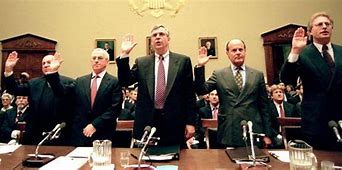In a dramatic departure from its past, the nation’s most reactionary, conservative and largest business lobbying group is responding to changes in Washington and calling on Congress to work together and “govern from the center.”
In an NPR radio interview today, the chairman of the U.S. Chamber of Commerce said it will start rating Congressional members on their ability to “work together.” Tom Wilson, Allstate Insurance chairman and CEO, who is also president of the U.S. Chamber of Commerce, said in the interview that “the center is a safe place” for Congress. He recommended that Congress avoid public political partisan fights.
To buttress this, he said the Chamber is introducing a new program that will rate elected officials on a scale of 10 points based on their ability to work with members of Congress in the opposite political party.
This radical change in policy from the U.S. Chamber of Commerce is noteworthy for a few reasons. First, the U. S. Chamber has been an advocate of the largest global corporations in the U.S. It also has largely championed Republican issues and overwhelming supported Republican candidates and issues in state and federal elections. Now, from that anchored conservative political position, it is suggesting that elected officials move to the center, including conservative Republicans. In exchange for this move, the Chamber will presumably reward these elected officials with large contributions.
Who Does the Chamber Represent?
Despite its name, the U.S. Chamber does not represent Main Street small businesses, but only the largest global American corporations. Founded in 1912, the Chamber primarily huge financial, insurance fossil fuel and banking industries.
According to Open Secrets, The Chamber ranked first out of 4,163 organizations in the size of its political expenditures. Its lobbying budget was $94.8 million in 2018 and $82.2 million in 2017. In the 2017-2018 election cycle, the Chamber’s independent expenditures were $5.9 million for Republicans and $0 for Democrats. Yet despite its huge budget, that money largely comes from just a few donors. Based on 2012 IRS data, of the $164 million in contributions to the Chamber, over half came from just 64 donors, according to Alyssa Katz in her book, “The Influence Machine.”

And despite its public proclamations about transparency, the Chamber often fronts for large companies and industries that want to stay in the shadows on controversial issues. This includes, climate change, immigration, trade deals, and the dangers of tobacco.
“Indeed, the ‘entire business model of the U.S. Chamber is premised on providing secret support for lobbying and campaigns,” says Katz. “The Chamber ‘fights regulations on behalf of companies that don’t want to be publicly associated’ with the positions they are advocating.”
Interestingly, the Chamber has also suffered withering criticism from conservatives. An article in the Mississippi Conservative quotes one conservative commentator as saying the Chamber is “a politically entrenched synod of special interests.” Even Donald Trump said: “The U.S. Chamber of Commerce is totally controlled by the special interest groups. They’re a special interest that wants to have the deals that they want to have. They want to have T.P.P., the Trans-Pacific Partnership, one of the worst deals, and it’ll be the worst deal since NAFTA.”
Why the Shift to the Political Center?
The Chamber’s call for the move to the political center is a dramatic move. In his interview, Wilson said “the [political] center is a safe place to be.” This is surprising since the Chamber has historically not occupied the political center, so maybe its polling shows the country is moving left. So, as a counter-weight, the Chamber may be trying to use its weight to stop the shift left by urging Congress to move “to the center” if it wants to reward elected officials with its huge largesse.
This may be an honest move to urge bi-party co-operation, but its largely multi-national big donors have largely embraced neoliberal policies in their international operations. These neoliberal policies are decidedly anti-individual and pro-corporate. So, while the Chamber’s political rating system for politicians to “move to the center” is noteworthy, it probably is an indication that their members see the populist shift to the left. This may also indicate that corporate America is preparing for a significant change in its customer base.











